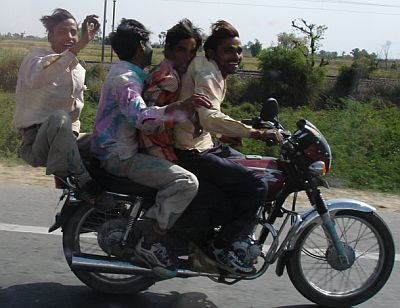
The “Happiness Index” though finds India with slightly shifting positions compared to the previously scored ones but largely it is believed that life in India is less stressful. In a recent survey it was found that the Indians are the second most happiest people on earth after the Americans. The US people might have scored over the Indians because of the comforts and the abundance of resources available in their country, but culture, religion, faith, domestic and community life and, above all, the Indian lifestyle, coupled with a feeling of contentment, perhaps, are the major contributing factors in this country. These factors enable the people in India to lead a less stressful life compared to that in the West.
Talking of India, Mark Twain says: “Land of dreams and romance. The country of a hundred nations and a hundred tongues; of a thousand religions and two million gods. Cradle of human race, birthplace of human speech, mother of history, grandmother of legend, great grandmother of tradition; the land that all men desire to see and having seen once by even a glimpse, would not give that glimpse for the shows of all the rest of the globe combined.”
Without passing any value judgment and simply commenting on the lifestyle of Westerners, I, having been afforded an opportunity to see alien lands, and thus being witness to the monotonous life they live, with their daily dose of boredom, getting the better of the most affluent even, has a saga of its own to be told when contrasted with the Indian lifestyle. The street fights, a shave at the barber saloon, a tete-a-tete at the paan shop, the mohulla corner gossip of women, a family get-together on festivals and a myriad of other such encounters have spice and soul in them in comparison to the “holidaying on weekends” of a Western couple, reading newspapers, with their car parked at lake-side, idling for hours and hours and returning home to wait for another day to begin and planning another “holiday” the coming week, pales into boredom of sorts.
Gunnar Myrdal, the Swedish economist and author of many works on development economics, who shared the Nobel Prize in 1974, has described India as a soft state but in a different economics-related concept. But even if the expression — soft state — in the Indian context is taken to be relevant in its real and literal sense, there should be no exaggeration, rather an admission of facts, since the culture and tradition, as practised in India, seem to be as old and acceptable a reason as any known and sensible (read respectable) civilisation which flourished anywhere in the world. The age of any civilisation still pulsating with the relevance of existence is undoubtedly the yardstick of the contentedness and happiness in that society.
Ours is a society of optimistic people. To ward of pessimism, Indians have their own ways and means devised in the form of various faiths. That the Indians are fatalists only confirms their being God-loving or God-fearing.
An average Indian is not at all an ambitious person. Although the get-rich-quick bug is affecting the younger generation of late, this again is a legacy of the industrialised countries. Indians have proved it to the world that their simplicity of lifestyle and thought is matchless. We are a people who are lovers of idealism.
Indian social life has no parallels in the world. The fairs organised with fervour not only add spice to the life of average Indians but also go a long way in preserving their culture. Customs, rituals, rites, ceremonies and marriages are some of the things which ensure an incessant flow of happiness and Indianness to us. The festivals celebrated with regularity and with indulgent participation not only unite the people but also assure a perfect assimilation of diverse cultures and mutual acceptability.
The Western society is surely a stressed society. In the face of personal tragedies, misfortunes catastrophes, people in the West consult psychiatrists to be normal. They too seek happiness. They too long for relatives. They too love their parents. But the situation is entirely different in their case. They experience a crisis of faith when it comes to relations, of whatever kind. One can see foreigners sitting on Har ki Pauri at Haridwar. The attendance during the discourses of Indian scholars of spiritualism in alien lands proves beyond doubt that the Indian lifestyle does have something in it that is really “remedial” in matters mundane or spiritual, whether one is in India, America, Japan or Germany.



